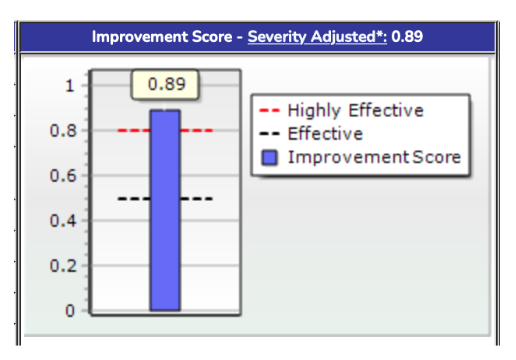High Quality, Evidence-Based Eating Disorder Care: How Do You Know If Treatment Is Working?
Nothing short of “highly effective.”
High five for good results.
Columbus Park has been delivering high quality*, evidence-based care to individuals with eating disorders since 2008. *Given our dedication to collecting outcome data, we’re able to use the phrase “high quality” with great confidence.
Columbus Park uses several different methods to track patient progress, duration of treatment, and our overall efficacy as a team of mental health providers.
One of the most important outcomes that we track is the overall improvement that our patients experience – both individually and collectively – while in treatment at Columbus Park. By collecting data on symptom change at regular intervals throughout treatment, the system we use can churn out a “score” known as an “effect size.” Effect size is a value used to quantify change; essentially, a number that represents both the direction and magnitude of the effect of (or response to) treatment. Effect size can also be referred to as an “improvement score” which is a nice descriptor to capture the meaning.The improvement score or effect size for treatment at Columbus Park from 2015-2022 is 0.89 (graph below), which is above the threshold for treatment to be considered “highly effective.” According to The ACORN Criteria for Effectiveness (ACE), an effect size of 0.5 is considered “effective” treatment. Effect size over 0.8 is considered “highly effective.”
The System
Columbus Park works with a consulting and data analytics firm, The Center for Clinical Informatics (CCI), to guide our outcome collection practices. CCI specializes in the measurement of treatment outcomes for behavioral health care. CCI connected us to the ACORN clinical information system (ACORN Toolkit), a comprehensive clinical information system that contains outcome data for over one million episodes of care and over three million completed questionnaires. Use of this platform has been shown to improve treatment outcomes over time. (Brown, Simon, Cameron & Minami; 2015).
The Questionnaire
To develop reliable questionnaires, ACORN uses an inventory of 394 items which have been tested and validated for use in behavioral health care. From these items, Columbus Park was guided in narrowing down to eleven items/questions that relate to several different domains: symptoms, social functioning, risk, substance use, and therapeutic alliance. The final survey questionnaire consists of eleven questions about the frequency of problems and symptoms (e.g. “In the last week, how often did you feel preoccupied with your shape and/or weight? 0 = Never; 1 = Hardly Ever; 2 = Sometimes; 3 = Often; 4 = Very Often”).The questionnaire is delivered on a tablet computer at the beginning of each treatment session. When the items on the questionnaires are viewed collectively, they provide a measure of what’s called Global Distress. Global Distress is the factor common to virtually all patient self-report outcome measures used in psychotherapy, and it allows Columbus Park data to be compared against a database of over 750,000 cases.
Feedback-Informed Treatment and Evidence-Based Care
When we started tracking outcomes at Columbus Park, our effect size was in the 0.5 range. What we found—which is consistent with the literature—was that questionnaire completion by every patient at every session, coupled with weekly reviews by clinicians and adjustments to treatment as indicated, resulted in a dramatic improvement in our outcomes. It makes sense: Measure patient symptoms at treatment onset and along the way and use the feedback to adjust treatment. With access to ongoing data, we can tweak treatment sooner and more effectively if/when someone is not responding.
Columbus Park outcomes are excellent, and our evidence-based care is only getting better with time. How?
For one, we’re paying attention; if a patient is not responding promptly to treatment (and we can see this clearly as we track the treatment response via regular surveys), we take action immediately to address whatever may be getting in the way.We also use the most potent treatments available. We are an evidence-based practice, which means that we use well-defined, structured, behaviorally-oriented treatments. We deliver these treatments with skill and with fidelity to the treatment models. So we don’t dabble in these treatments; rather, we deliver them in the way they are intended and see how this impacts our results.And third, our clinicians are recruited via a rigorous selection process. And then once part of our team, they get an extraordinary level of training and ongoing consultation and development. This leads to a professional culture in our practice of committed, stimulated providers – true experts with vast breadth of knowledge – who are wholeheartedly engaged in their work of helping people recover.Whether you turn to Columbus Park or another reputable provider for your eating disorder treatment, when it comes to choosing the best course, be sure to ask about outcomes. Being an educated consumer is essential, and results matter.If you or a loved one is facing disordered eating of any kind, please don’t hesitate to schedule a complimentary call with one of Columbus Park’s experts.


